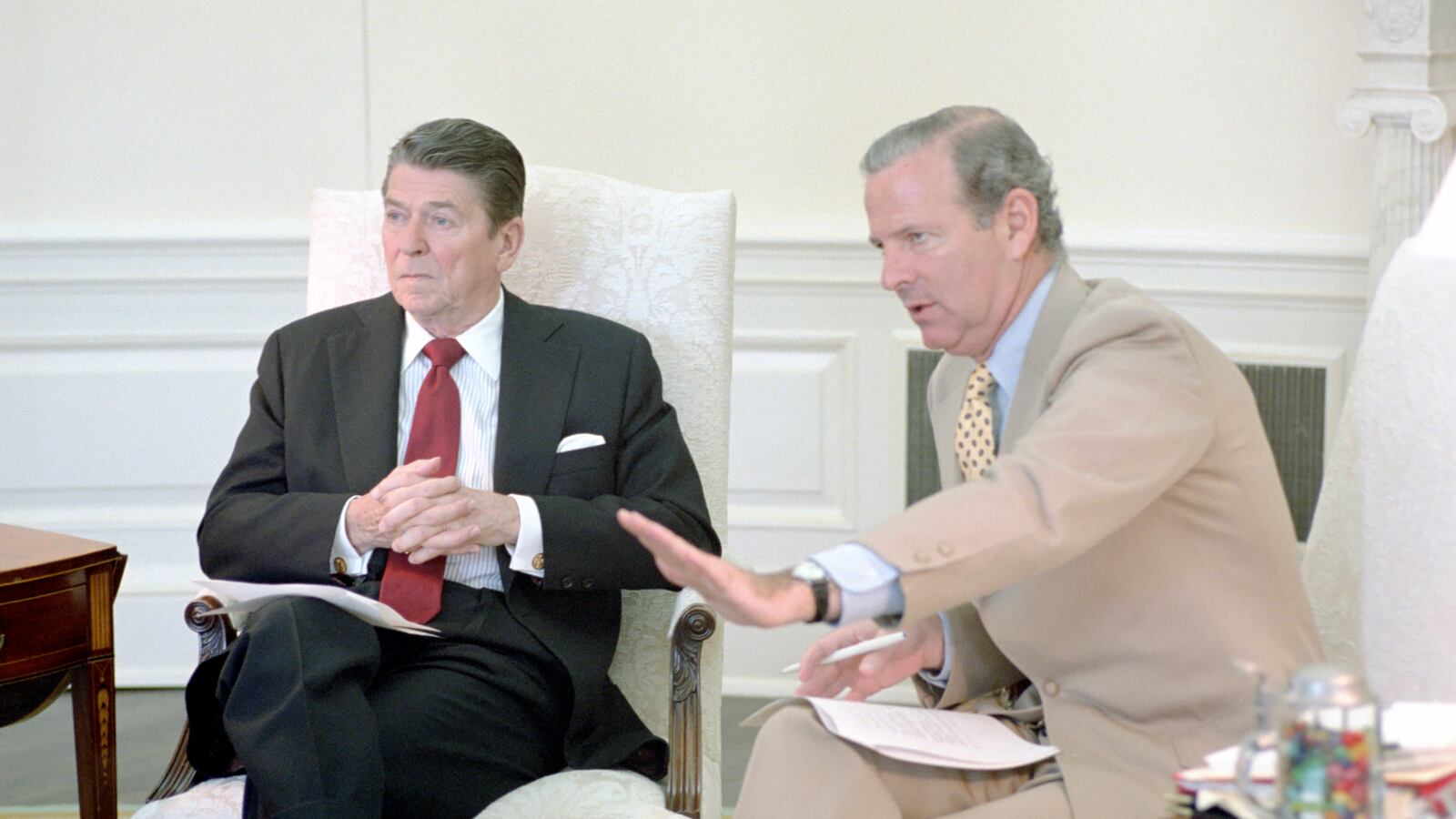You’d think with a four-hour documentary, there wouldn’t be much on the cutting room floor. But the producers of The Presidents’ Gatekeepers had 90 hours of footage to cull, and they likened the editing process to using a meat cleaver. In a way it shows -- the opening scenes of this ambitious documentary jump around among the 20 living chiefs of staff interviewed irrespective of when they served and without a narrative timeline that seems to make sense.

“I was 29; I felt 59,” says Jim Jones, pictured at LBJ’s side, the youngest person to hold the job and a witness to how Johnson “brooded” over Vietnam. Ken Duberstein, who worked for President Reagan, reminds viewers that it’s the chief of staff who gets the 3 a.m. phone call and decides whether to disturb the president.
“Everything that gets into the oval office is between bad and worse,” says Rahm Emanuel, Obama’s first chief of staff, and the pressure on the gatekeeper is constant. Emanuel recalls reading to his children and falling asleep before they did, only to be woken by a late night phone call. Yet to a man – and they’re all men – Emanuel says if given the opportunity to do it again, they’d all say yes.
The Presidents’ Gatekeepers aired on the Discovery Channel over two nights last week, and on Tuesday evening – the same night as President Obama’s speech to the nation –the first hour of the four-hour production was shown to an invited audience in Washington that included five of the chiefs of staff featured in the documentary. A reception followed, during which Obama’s remarks were piped in. The crowd was underwhelmed, and Duberstein pronounced the speech “a mishmash,” saying it wouldn’t change any votes. It’s safe to say if there’s a Presidents’ Gatekeepers Two, Obama’s Syria speech probably wouldn’t make the cut.
The documentary is at its best when it gets into telling stories through the eyes of these loyal staffers of the most iconic moments in recent presidential history. “I am not a crook” (Nixon) and “I did not have sexual relations with that woman” (Clinton) set the stage for longer narratives about the backstage maneuvering after the assassination attempt on President Reagan, told by chief of staff James Baker, and the 9/11 attacks on New York and the Pentagon, relived in chilling detail by chief of staff Andy Card.
Baker is the gold standard for the job, ambitious, charming and indisputably effective at managing the levers of power. Duberstein puts it best: “Baker understood campaigning but he was a real pro at governing.” Baker recounts decisions he and others made while huddled in a utility closet at George Washington Hospital as Reagan underwent surgery to remove a bullet. It was so early in Reagan’s presidency they decided that invoking the 25th amendment and formally passing power to Vice President Bush would be seen as a power grab. Baker describes how Secretary of State Al Haig unbidden took over the press briefing and, sweating profusely, declared, “I am in control here.”
“Al ended up imploding in my view,” Baker says, recounting how his message when he got back to the White House was that the prognosis for the president “is better than good – but they (the doctors) wouldn’t say very good.” Two or three days after Reagan’s surgery, he got an infection that could have cost him his life, Baker says, noting the irony that this catastrophic event just two months into his presidency that could have ended everything instead made Reagan stronger politically, allowing him to achieve his signature proposal, dramatic tax cuts, with Democratic votes.
This may be familiar ground to those who were alive thirty years ago and following events in Washington closely, but for a lot of people this will be revelatory, and for others – like me – who reported on the Reagan White House, a riveting refresher course on what Reagan and his top aides faced.
The same is true for the rendition of the day that President Bush sat reading to second graders in Florida, and Andy Card whispered in his ear, “A second plane hit the second tower. America is under attack.” Card explains how he stepped back to do nothing to invite a question while Bush sat there for seven excruciating minutes before excusing himself. Card, ever loyal, says he was glad Bush stayed put so he, Card, could get the FBI director on the phone and put the mechanisms of power into place. He describes how Bush wanted to go back to Washington, yelling at him, “I’m the president of the United States,” while the Secret Service refused to give the go-ahead until they knew more about the nature of the attacks and whether more were coming.
For those looking for scoops, Executive Producer Chris Whipple says Rahm Emanuel recounts for the first time a security threat that he and others were dealing with in the White House Situation Room on Inauguration Day in 2009. But the documentary is less about uncovering secrets than giving insights into what it’s like to be at the center of power, “catching the javelins meant for the old man,” in Baker’s words. And it puts such an effective human face on the job that Dick Cheney, who at age 34 was President Ford’s chief of staff, gets to describe how First Lady Betty Ford always wanted to dance on top of the Cabinet Room table, and just before they turned the reins of power over to Jimmy Carter, that’s what she did. The photograph is an epitaph for a short-lived presidency and a reminder that moments like this are worth remembering and recording.






